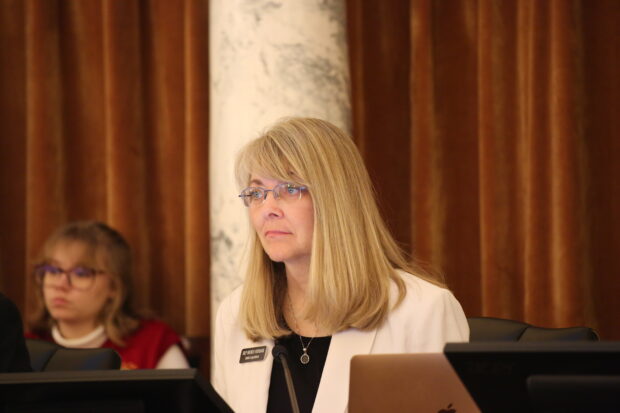When Idaho colleges and universities need legal help — with a political firestorm, a complicated bond issue, or any number of other matters — Boise-based Hawley Troxell is their go-to law firm.
And over the past three years, they have gone to Hawley Troxell for more than $850,000 of work.
The invoices from the schools — obtained by Idaho Education News, through public records requests — are heavily redacted. Nearly all details are blacked out. One of Hawley Troxell’s senior attorneys declined to answer most questions about his firm’s work, citing attorney-client privilege.

But co-managing partner Tom Mortell said his firm generally steps in to handle a specialized legal job, or a project that would swamp a school’s in-house legal team with only a handful of attorneys.
“Some types of cases, you need a team of people,” Mortell said in a recent interview. “And a large law firm could put a team of people on something.”
With 110 attorneys and satellite offices in Pocatello, Idaho Falls and Coeur d’Alene, Hawley Troxell is one of Idaho’s largest and most prominent law firms. And in the past couple years, their legal work has placed them at the epicenter of some of the state’s most high-profile higher ed controversies.
How the legal bills add up
EdNews requested invoices from Idaho’s eight public colleges and universities, from Jan. 1, 2021 to the fall of 2023. Here’s the breakdown:
- University of Idaho: $482,857.96. The billings include a 2021 investigation of U of I diversity and inclusion programs, and a 2022 followup. Hawley Troxell has billed the U of I more than $363,000 this year alone — an uptick connected with the U of I’s proposed purchase of the University of Phoenix. U of I spokeswoman Jodi Walker said the Phoenix-related legal costs “are written into the transaction and will be reimbursed to the university upon close of the transaction.”
- Boise State University: $167,191.50. Boise State hired out a 2021 investigation of University Foundations 200, a required diversity course, which Boise State suspended after fielding a complaint from an unidentified legislator. But Boise State’s costliest item was $75,000 in legal work related to a 2023 bond issue.
- College of Western Idaho: $147,137.47. CWI also hired Hawley Troxell for bond work in 2022, totaling $90,000, and for work on college President Gordon Jones’ contract.
- Lewis-Clark State College: $45,000. All of this work involved a 2021 bond issue, for $4 million in financing for a newly acquired residence hall.
- Idaho State University: $14,526.57. The bulk of the invoices fall under two vague headings: “Boise real estate matters” and “lease modification.”
TOTAL: $856,713.50.
North Idaho College, the College of Southern Idaho and the College of Eastern Idaho did not contract with Hawley Troxell.
Why outsource?
Most of Idaho’s colleges and universities have in-house counsel: six attorneys apiece at Boise State and the U of I, and two at Idaho State. Lewis-Clark keeps an attorney on retainer to handle most of the college’s legal issues. So why do they need to hire outside attorneys?
For the U of I, Hawley Troxell’s biggest higher ed client, it often comes down to basic workload factors.
“University of Idaho contracts with outside counsel for a variety of reasons, most often because of either the volume of work internally and/or a need for specialized expertise,” Walker said in an email.
Typically, Mortell said, the colleges and universities outsource their most specialized legal work to Hawley Troxell. That work includes IT contracts, construction and real estate — and, in many cases, bond financing.
Hawley Troxell usually winds up assigning a couple of lawyers to a bond issue, to research and write the “opinion letters” that go out to would-be lenders. It’s time-consuming and specialized legal work.
“There’s not a huge number of bond lawyers in Idaho,” Mortell said. “There’s us and a few others.”
And for CWI, outsourcing the bond work gives an in-house legal staff of two employees time to focus on everything else — from student privacy and employment matters to pending legislation.
“There’s quite a bit of work that they’re overseeing internally,” spokesman Ashley Smith said. “They can’t hit pause.”
Still, the heavily redacted invoices hint at a wide variety of outsourced legal work.
Boise State contracted with Hawley Troxell a 2022 “workplace investigation,” trademark issues and compliance with the Health Insurance Portability and Accountability Act, better known as HIPAA.
In a statement, Boise State spokesman Mike Sharp did not answer questions about any of these specific topics. But he said the university’s in-house legal team works to rein in the costs of outsourcing.
“General counsel provides a specific scope of work and regularly monitors progress and billing to ensure services are delivered in a satisfactory and cost-effective manner,” he said.
This same wording appeared, verbatim, in a statement to EdNews from Idaho State spokeswoman Emily Frandsen.
‘We’re going to call it as we see it’
Over the past three years — as Idaho’s higher education system has come under increased scrutiny at the Statehouse — Hawley Troxell has also found itself squarely in the spotlight.
- In May 2021, the firm’s UF 200 course examination exonerated Boise State. The university had moved the diversity class online in March of that year, amidst complaints that students in the class had been harassed for their personal views. In Hawley Troxell’s investigation, which cost the university close to $31,000, no UF 200 students said “they were ever forced to apologize for the color of their skin.”
- In a December 2021 report to the U of I, Hawley Troxell said it found no evidence of “a systematic commitment to forcing social justice ideology upon (university) students.” The report became a centerpiece of President C. Scott Green’s counterstrike against the Idaho Freedom Foundation. Famously labeling the hardline conservative group “conflict entrepreneurs,” Green said the foundation had used a false narrative to convince the 2021 Legislature to cut $2.5 million from the higher ed budget, including $500,000 from U of I.
- A December 2022 followup report exonerated the U of I, again saying its diversity and inclusion initiatives “do not rise to any level of impropriety.”
- Hawley Troxell has carried out a variety of legal work supporting the U of I’s proposed Phoenix purchase — from fielding a surge in public records requests to navigating a brief branding dispute. And Hawley Troxell’s legal opinions appear prominently on a U of I “frequently asked questions” page on the purchase. Hawley Troxell sides with the U of I on several legal points — including, most notably, the U of I’s plan to create a nonprofit that would finance the $685 million Phoenix purchase.
Hawley Troxell’s reports haven’t quelled the Statehouse debate over campus social justice — a contentious topic that is sure to resurface when the 2024 Legislature convenes in January. And Hawley Troxell itself has come under attack; in June 2021, Freedom Foundation President Wayne Hoffman called the Boise State UF 200 report “more media ploy than investigation,” and challenged the independence of lawyers hired by the university.
Mortell defends Hawley Troxell’s work, saying the firm has taken the time it needs to fully investigate the issues at hand. He also defends Hawley Troxell’s independence. The universities are clients, he concedes, but no client is so large that it has a “financial stranglehold” over the firm.
“If the conclusions we come to are contrary to what the client wants to hear, well, they hired us to get to the bottom of it,” he said. “We’re going to call it as we see it.”
‘Maybe we are heading into a broader conversation’
The $850,000 bottom line took one key legislator by surprise.

“I guess I didn’t realize they are of counsel to so many institutions in this state … and doing this much work,” said Rep. Wendy Horman, R-Idaho Falls, co-chair of the budget-writing Joint Finance-Appropriations Committee.
But Horman also said some of the outsourcing makes sense. As a former Bonneville School District trustee, Horman remembers the district going to Hawley Troxell for bond counsel, so she can understand the colleges and universities taking a similar approach. She also understands why Boise State and the U of I turned to Hawley Troxell for reports on diversity issues. “They had to go external, for it to have credibility.”
By no means is Hawley Troxell the only outside attorney doing work with the state. Then-state superintendent Sherri Ybarra paid Boise attorney David Leroy more than $118,000 for legal work — stemming, in part, from her unsuccessful legal challenge of a plan to shift employees from her department to the State Board of Education. The State Board, meanwhile, has run up more than $81,000 in outside legal costs defending itself in a lawsuit challenging closed-door meetings on the Phoenix purchase.
And, as Horman notes, the Legislature frequently hires its own lawyers.
“Maybe we are heading to a broader conversation about legal representation.”
An unapologetic advocate for education
Hawley Troxell has not made a conscious decision to pursue more work from higher ed clients. “If it comes, it comes,” said Mortell, who has been with the firm since 1996.
But there is nothing accidental about the firm’s advocacy for the value of higher education.
Mortell makes no apologies for being a supporter of higher ed. His firm relies on Idaho universities to produce the employees it needs to succeed. Hawley Troxell’s education clients “are trying to do good things in the world,” he said. However, Mortell realizes his opinion isn’t the only opinion.
“I believe there are some political forces right now that are causing significant headwinds for public education in Idaho.”
And that puts education — and, by extension, Hawley Troxell — under a spotlight.
Further reading:
